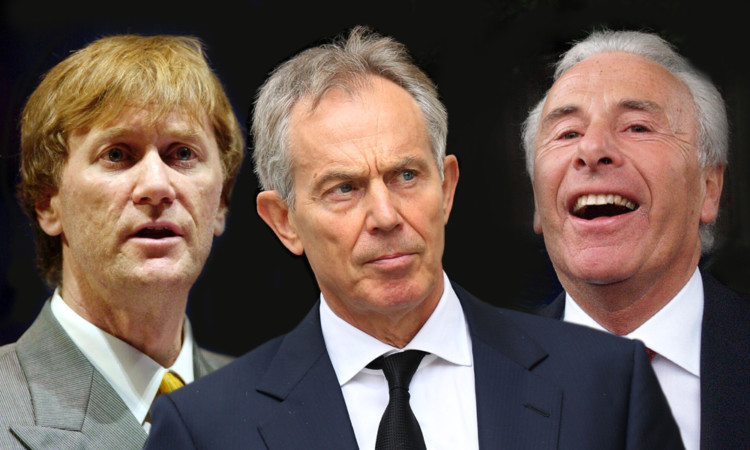
The cash-for-honours row was dramatically re-ignited last night after the Met Police revealed it was reviewing its original investigation.
Scotland Yard is taking action after former Lib Dem peer Lord Oakeshott claimed the practice of offering peerages to party donors was still rife.
Police chiefs have written to SNP MP Angus MacNeil to confirm they are reviewing the probe in light of the peer’s allegations.
Leading the review will be the top cop who was in charge of the 2006 investigation which saw a sitting Prime Minister interviewed by police for the first time when Tony Blair was questioned as a witness.
Three others Blair’s chief fundraiser Lord Levy, Downing Street aide Ruth Turner and wealthy Labour Party backer Sir Christopher Evans were arrested but never charged in connection with the allegations.
Mr MacNeil, whose complaint to the police kick-started the original cash-for-honours investigation, said: “I’m glad these recent revelations are being given the attention they deserve.
“While the Liberal Democrats concede the House of Lords is outdated and undemocratic they continue to stuff it with cronies.
“The SNP’s long-standing position is that we believe those making laws should be elected by the people, and therefore we do not nominate members to the House of Lords.”
Referring to the upcoming independence referendum, the Western Isles MP added: “If the rest of the UK want to keep funding the House of Lords, it is a matter for them.
“A Yes vote would mean that people in Scotland could get rid of the expensive and unrepresentative Westminster tier saving around £50m a year in not sending MPs and peers to London.”
Lord Oakeshott, an ally of Vince Cable, quit the Lib Dems last month after calling for Nick Clegg to be replaced as leader.
In his resignation statement he said: “My efforts to expose and end cash for peerages in all parties, including our own, and help get the Lords elected, have failed.”
That prompted Mr MacNeil to urge the Metropolitan Police to once again look into the issue.
Now Assistant Police Commissioner Cressida Dick has written to him to say the file has been passed on to Commander Graham McNulty in Scotland Yard’s Specialist Crimes and Operations Directorate. He was the man who looked into the original allegations that political parties were nominating peers in return for huge loans at favourable rates.
That investigation was headed by assistant commissioner John Yates, dubbed Yates of the Yard, who has since left the force and been criticised for his botched handling of the original phone-hacking inquiry. With Lib Dem funding plummeting since they went into Government they have become increasingly reliant on big donations. The three biggest donors to the Liberal Democrats who have provided two-fifths of all the party’s donations have recently been given peerages by Deputy Prime Minister Nick Clegg.
The three Lords Ministry of Sound magnate James Palumbo, Domino’s Pizza founder Rumi Verjee and clothes tycoon Raj Loomba donated around £600,000 between them.
A Lib Dem spokesman said: “It is completely untrue that Liberal Democrats engage in cash for peerages.”
Cash for honours timeline
March 8 2006 Chai Patel, head of the Priory rehabilitation clinics, protests to the vetting committee for Lords’ appointments that his nomination to be a peer has been blocked. A few days later MP Angus MacNeil lodges complaint with the Met after it emerged four businessmen, who had lent the Labour party a total of £5m, were nominated by Tony Blair for peerages.
March 17 2006 Labour confirms it was secretly lent £14m ahead of the 2005 election. The party, and the businessmen involved, deny any wrongdoing as loans to political parties made on commercial terms did not have to be disclosed.
July 12 2006 Labour’s chief fundraiser Lord Levy is arrested and questioned.
December 14 2006 Tony Blair becomes the first serving Prime Minister to be interviewed by police. However he was only interviewed as a witness, rather than as a suspect.
January 26 2007 Tony Blair interviewed for a second time.
April 20 2007 Metropolitan Police hand over a 263-page file to the Crown Prosecution Service.
October 9 2007 Crown Prosecution Service announces no charges will be brought.

Enjoy the convenience of having The Sunday Post delivered as a digital ePaper straight to your smartphone, tablet or computer.
Subscribe for only £5.49 a month and enjoy all the benefits of the printed paper as a digital replica.
Subscribe